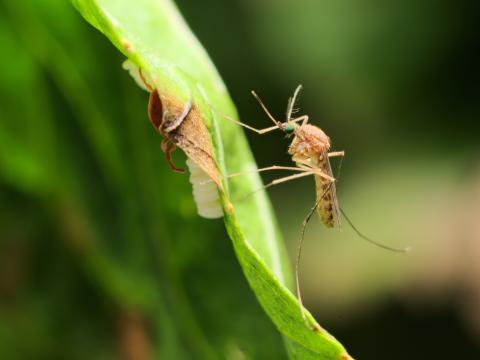West Nile Virus: About
West Nile virus is an illness spread by the bite of an infected Culex species mosquito.
West Nile virus cases occur throughout the U.S. In Wisconsin, West Nile virus was first found in wild birds in 2001, and the first human infections were reported in 2002.
Anyone can get West Nile virus, but people who spend more time outdoors are at a higher risk of being bitten by an infected mosquito. Mosquitoes are usually most active in Wisconsin from May to September.
The mosquitoes that spread West Nile virus can be found in areas near standing water, which they need to breed. It is important to remove standing water sources, such as containers, leaves, and yard debris, to reduce breeding habitats in your yard.
Map description
The map shows the total number of West Nile virus cases reported in each Wisconsin county during the 10-year period of 2015 through 2024 per 100,000 people.
Protect yourself with Mosquito Bite Prevention
About West Nile virus
West Nile virus is spread to humans through the bite of an infected mosquito.
Mosquitoes get infected with West Nile virus by feeding on infected birds. After feeding on a bird that has West Nile virus, the virus may end up inside of the mosquito. Once it has the virus, a mosquito can spread the virus to other birds and mammals, including humans, when they take another blood meal.
Few mosquitoes actually carry the virus, but it is important to prevent mosquito bites when spending time outside.
The mosquitoes that spread West Nile virus are active during the summer and into the fall, or anytime during warm weather months. The risk of West Nile virus is present anytime mosquitoes are active, but it is highest during the months of August and September.
West Nile virus cannot be spread from person to person or directly from a bird or other animal to a person.
It is possible to become infected with West Nile virus through a blood transfusion or organ transplant from infected donors, but this is very rare. Read more about West Nile and Blood Transfusions and West Nile and Organ Transplantation from the CDC.
Dead bird reporting
As of January 2020, the Division of Public Health no longer collects dead birds for West Nile virus testing. Due to this change, the Dead Bird Reporting Hotline (800-433-1610) has been disconnected.
What should I do if I find a dead bird?
Refer to the Wisconsin Department of Natural Resources Wildlife Health Program for instructions on what to do if you find a dead bird. If you are told to dispose of the bird’s carcass, don’t handle it with your bare hands. Use gloves or an inverted plastic bag to place the carcass in a garbage bag, which can then be placed in your regular trash.
Symptoms can start three to 14 days after being bitten by an infected mosquito.
About 80% of people infected with West Nile virus never develop symptoms, while about 20% of people may experience mild illness. Less than 1% of people infected will become severely ill. In rare cases, the infection may be fatal, especially in the elderly and people with other medical conditions. Past infection with West Nile virus can make you immune to the virus in the future.
Mild signs and symptoms
- Fever
- Headache
- Muscle aches
- Joint pain
- Rash
- Swollen lymph nodes
- Photophobia (sensitivity to light)
- Nausea
- Vomiting
Severe signs and symptoms
- Extreme muscle weakness
- Inflammation of the brain (encephalitis)
- Confusion or disorientation
- Paralysis
- Coma
- Death
There is no specific anti-viral treatment or vaccine for West Nile virus. Over-the-counter pain relievers may be given to relieve mild symptoms.
In severe cases, patients may need to be hospitalized to receive supportive care.
If you believe you or a family member may have West Nile virus, contact your doctor.
Resources from the Wisconsin Department of Health Services (DHS)
- Signs, symptoms, and prevention—West Nile Virus Fact Sheet, P-42104
- Fact sheet with simple steps to take to prevent bites—Protecting Your Family From Mosquitoes and Ticks, P-02080 (PDF)
Resources from the CDC (Centers for Disease Control and Prevention)
- Signs and symptoms, treatment, prevention, and more—West Nile: Symptoms, Diagnosis, and Treatment
- Steps to take to avoid bites—Preventing Mosquito Bites
- Educational activity book for kids—Mosquito Bites Are Bad (PDF)
Partner resources
- Information from the University of Wisconsin-Madison Medical Entomology Laboratory—Mosquitoes of Wisconsin
- Research conducted by the Midwest Center of Excellence for Vector-borne Disease—Mosquito Projects
Contact us
Questions about illnesses spread by mosquitoes? We’re here to help.
Bureau of Communicable Diseases
Phone: 608-267-9003
Fax: 608-261-4976


